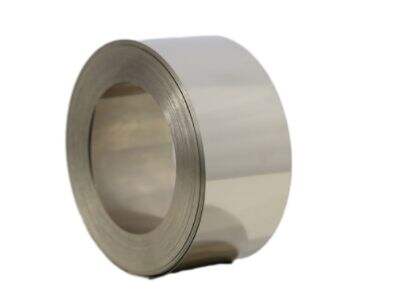In many industrial applications where wire for precision resistors is used, there are a number of considerations. From specifying the correct alloy for high-temperature applications to assessing corrosion resistance, there are important factors that can affect how these materials will perform. It is not only electrical conductivity and thermal stability, but mechanical properties that influence Precision resistance alloy material to work efficiently. If these aspects are being understood and the best approach is taken, the resources can be used in a most efficient way and for a maximised impact.
Guiding values for the choice of a precision alloy Resistance
Precision resistance alloys should be selected based on semi-classic measuring procedures such as resistance thermometry. The selection of precision resistance alloy for industrial application must take into account numerous factors, such as the detail requirements of working conditions, environmental medium and performance properties required. There are various combination of different nickel alloy wire with compositions and properties, selection of the suitable one, will affect a lot of the performance. It is critical to assess resistivity, temperature coefficient of resistance and chemical compatibility characteristics to confirm the alloy selected will satisfy performance requirements and deliver satisfactory field performance.
Selecting the correct resistance alloy for high-temperature applications
A key to long-term stability and reliability in high-temperature applications is the proper choice of a resistance alloy. The temperature, heat resistance and oxidation resistance of the alloy also need to be seriously considered so that it will not fail or deteriorate under the harsh condition that requires high-temperature-operation. Users can select Kuaike Precision Alloy alloy of nickel and chromium known for high-temperature stability and mechanical properties to experience that their material will outlast in high temperature applications and maintain performance over the long term.
Factors to be considered when judgment is made about the anti-corrosion performance of precision resistance alloys
The resistance to corrosion must be considered in intended use of precision resistive alloys, and especially so when used in the industrial settings if they are expected to be used around moisture, chemicals or other types of corrosive agents. By choosing the right quality of corrosion-resistant type alloys, users can avoid all forms of decay that would otherwise have resulted in material becoming rusty or destroyed and thus not functioning. The corrosive risk in the operating environment should be evaluated and alloys with the specific resistance to this condition should be selected, taking long-life durability and reliability into consideration.
The influences on electrical conductivity and thermal stability of precision resistance alloys
The electrical resistivity as well as thermo stability of resistance alloys with precision are very important at performance and efficiency of the material. To maximise energy transfer and run efficiently it has high conductivity, and because of temperature the material must be an excellent thermal conductor to remain structurally stable. Another thing that can affect these properties is the alloy composition, the way it's made (i. e. processed), and how pure it is so you need to find an alloy who value both good electrical conductivity and thermal stability in order to meet your power needs.
How to improve performance of precision resistance alloy through mechanical properties?
Besides the electrical conductance and the thermal resistance, of course, the mechanical characteristic of precision resistance alloys also affects their performances in industry. The tensile strength, ductility and hardness will likewise influence the durability of the material, it's flexibility and overall lifespan. By controlling the mechanical properties of precision resistance alloys by selecting alloy composition, processing method and heat treatment in the most appropriate way, it is possible to improve performance and service life of these materials for applications. When investing in high grade alloys with stronger mechanical characteristics, you can get more out of your investments such as maximized efficiency and minimized maintenance for a range of applications across many industries.
For industrial use of precision resistance alloys the issue need be reviewed regarding various factors which may influence the behavior, life or reliability of such materials. By choosing the optimum alloy for the application requirements, evaluating important characteristics such as high-temperature stability and corrosion resistance; and optimising factors like electrical conductivity and thermal stability – users can ensure that these materials will perform to its maximum potential in their operations. With attention to the mechanical properties of precision resistance alloys, and by applying best practices in selection and use, users can continue to rely on these products for years to come across a spectrum of industrial environments. With the proper understanding and guidance, likewise a basic application of tools, users can take advantage of everything precision resistance alloys have to offer in the quest to meet their operational goals, and promote success within their industry.
Table of Contents
- Guiding values for the choice of a precision alloy Resistance
- Selecting the correct resistance alloy for high-temperature applications
- Factors to be considered when judgment is made about the anti-corrosion performance of precision resistance alloys
- The influences on electrical conductivity and thermal stability of precision resistance alloys
- How to improve performance of precision resistance alloy through mechanical properties?
 EN
EN
 AR
AR
 DA
DA
 NL
NL
 FI
FI
 FR
FR
 DE
DE
 EL
EL
 HI
HI
 IT
IT
 JA
JA
 KO
KO
 NO
NO
 PL
PL
 PT
PT
 RO
RO
 RU
RU
 ES
ES
 SV
SV
 TL
TL
 IW
IW
 ID
ID
 SR
SR
 SL
SL
 UK
UK
 VI
VI
 HU
HU
 MT
MT
 TH
TH
 TR
TR
 AF
AF
 MS
MS
 GA
GA
 AZ
AZ
 MN
MN
 MY
MY
 KK
KK
 UZ
UZ
 KY
KY
 BN
BN

